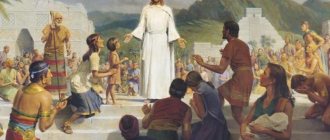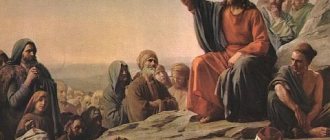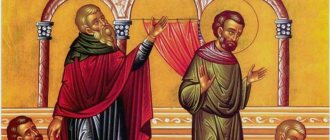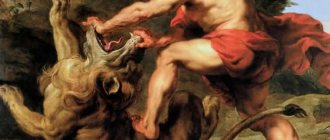The combination of wisdom, depth and brevity of the narrative once again speaks of the divine origin of the Gospel. All the words of Jesus that have come to us thanks to the efforts of the evangelists are brief and carry special Divine wisdom.
Many sages of the past era and today left behind hundreds of works, but the Son of God only needed a few words to convey the most important thing in them - to tell people how they can be saved and enter Eternity.
The Bible is full of metaphors and allegories, which makes it not only a source of God's wisdom, but also a highly artistic work. A striking example of such unusual metaphoricality is the parable of the rich man and Lazarus.
Parable of the Rich Man and Lazarus
The parable of the rich man and Lazarus gives us an example of the extremely unreasonable use of material wealth and lifts the veil over some of the secrets of man's afterlife. We find this parable in the Gospel of Luke:
“A certain man was rich; He dressed himself in purple and fine linen, and feasted brilliantly every day. There was also a certain beggar named Lazarus, who lay at his gate covered with scabs and wanted to be fed with the crumbs falling from the rich man’s table; and the dogs came and licked his sores. The beggar died and was carried by the Angels to Abraham's bosom. The rich man also died and was buried. And in hell, being in torment, he raised his eyes and saw Abraham in the distance and Lazarus in his bosom. And he cried out and said: Father Abraham! have mercy on me and send Lazarus to dip the tip of his finger in water and cool my tongue, for I am tormented in this flame. But Abraham said: child! remember that you have already received your good in your life, and Lazarus - evil; now he is consoled here, and you suffer. And on top of all this, a great gulf has been established between us and you, so that those who want to cross from here to you cannot, nor can they cross from there to us. Then he said: I ask you, father, send him to my father’s house; for I have five brothers; let him bear witness to them so that they do not come to this place of torment. Abraham said to him: They have Moses and the prophets; let them listen to them. He said: no, Father Abraham, but if someone from the dead comes to them, they will repent. Then Abraham said to him: If they do not listen to Moses and the prophets, then even if someone were raised from the dead, they would not believe it” (Luke 16: 19-31).
From the first reading of this parable, it is not entirely clear why the rich man went to hell. Was it because he was rich in life? We know from the Gospel that wealth, although it can be tempting and not always useful for spiritual life, still not all the rich were condemned. The rich tax collector Zacchaeus, despite his wealth, was nevertheless saved by his entire family (Luke 19: 1-19). We remember the wealth of Joseph of Arimathea, a disciple of Christ, in whose tomb the Savior was buried (Matthew 27: 57–60). Also, one of the “chiefs” and leaders of the Israeli people, the Pharisee Nicodemus, was hardly a poor man. It was he who brought one hundred liters of expensive aromatic oils to anoint the body of Jesus Christ (John 19:39). We remember that one rich young man was not condemned by Christ for his wealth, which apparently did not prevent him from remaining a believer, a pious man, from his youth keeping all the commandments of God, and having learned about Christ, coming and worshiping Him as a Teacher. Christ did not at all condemn the life path of the rich young man, but showed him the most perfect path.
Christ never said that the rich will not enter the Kingdom of God, but that people who hope in wealth will not enter it, people who think that it is not God, but wealth that will save them (Mark 10:24), people who wealth makes an idol and an idol (mammon).
In the Bible we know examples of righteous people who were very rich people: righteous Joseph, the son of Israel, owned huge treasures of Pharaoh in Egypt, dressed like a king (Gen. 4: 40–45) and was the second person in the state. Righteous Job, blameless and God-fearing, was very rich: he had 7,000 heads of small cattle, 3,000 camels, 500 pairs of oxen and 5,000 donkeys and a lot of servants (Job 1: 3).
In the history of the Christian Church, many kings and kings were canonized - anointed kings who owned as property all the riches of their country, and this did not prevent some of them from becoming saints. In Russia and America there were and are millionaires who did a lot of good and gave away their enormous wealth to charity.
But still, why did the rich man in the parable we are examining go to hell? The Gospel does not say that he was evil, cruel, depraved, godless and wicked. All that is said is that he was rich and dressed very well. Like the Old Testament rich man Joseph, a courtier of Pharaoh, he dressed in fine, precious fine linen clothing (Gen. 40:42). The parable says that “the rich man feasted magnificently every day” by throwing dinner parties. In general, in his life he received everything good that could be received. But is it enough for a person to be rich to be condemned to eternal hellish torment? This, perhaps, is just as insufficient as being a beggar or a tramp is not enough to get into the Kingdom of Heaven for your poverty, for your unenviable social position. Don’t we know beggars who were evil, cruel, hating everyone and everything, lazy people who did not want to work and labor? Will they really be rewarded only for their beggary, despite their sins, and the rich will be punished only for their wealth? No! It is impossible, based on the parable of the rich man and Lazarus, to build a materialistic theory of world balance in the spirit of social equalization and justice.
In the problem of wealth, the Evangelist Mark reveals to us what the essence of the matter is and says that many rich people are condemned not for their wealth, but for their trust in it: “How difficult it is for those who have wealth to enter the Kingdom of God!” (Mark 10:23). Excessive satiety, satiety, and complacency are dangerous for a person. And it is precisely this, and not anything else, that is externally bad. It is not the money itself that is bad, but the attitude towards it. It is bad to be narrow-minded, complacent and complacent. And, on the contrary, it is good to always be dissatisfied with oneself, always hungry and thirsty for the Truth. It is good to always be poor in spirit and constantly ask for alms from Christ. Any satiety pampers a person, makes him a calm, unanxious, self-important spoiler, imagining about himself that he doesn’t need anything else, imagining about himself that he already has everything and not only nothing, but he doesn’t need anyone - not even a person. , nor God. It is precisely such a self-satisfied, serene and well-fed state that is dangerous for a person, for his conversion to Christ, whether he is rich or poor. We must never be calm, but must always seek and ask, always thirst and need, always recognize ourselves as poor, not independent, but dependent on God.
The rich man’s guilt was that he lived only for the flesh, enjoyed earthly blessings without measure and completely drowned out any manifestation of spiritual life. It was by this that he prepared a bitter fate for himself. Ap. Paul says: “Do not be deceived: God is not mocked (in Greek “he is not humiliated”). Whatever a man sows, that he will also reap: he who sows to his flesh will reap corruption from the flesh, but he who sows to the Spirit will from the Spirit reap eternal life” (Gal. 6:7). Each person prepares his own afterlife. If he remains in the will of God, i.e. keep His commandments, commanding love for God and neighbor, will repent when he transgresses these commandments in some way, if he feeds his soul with church sacraments, if he remains in prayerful communion with the Lord, then about such a person we can say that he “ sows to the spirit." Such a person, even in this life, begins to communicate with the spiritual world and becomes, as it were, its citizen. After death, such a person enters a better world and enjoys its benefits, since in his temporary life he managed to acquire the ability to enjoy them.
True faith begins with repentance - only with repentance, i.e. from the consciousness of one’s insufficiency, one’s spiritual poverty and sinfulness. “Repent, for the Kingdom of God is at hand,” says both the Forerunner and Christ (Matthew 3:2; 4:17). The Kingdom of God not only begins, but also continues and is supported only by repentance, the consciousness of one’s limitations, sinfulness and spiritual poverty. The constant prayer of a Christian consists of short words: “Lord Jesus Christ, Son of God, have mercy on me a sinner!” Without this prayer, a Christian cannot live and dies spiritually. The consciousness of his sinfulness, poverty and helplessness makes a Christian a worthy disciple of the Savior, a worthy member of the Church of Christ, despite the sinful nature into which he was born.
The poor Lazarus received a heavenly reward, of course, not for material poverty, but for the consciousness of his spiritual poverty, for the fact that in this sense he apparently obeyed Moses and the Prophets (Luke 16:29). And the rich man in the parable was punished because he did not have this spiritual poverty, that he was not only physically, but also spiritually well-fed, and, like an idol, he relied on his wealth, and did not feel the need for God’s help.
If a person only moves from one amusement to another, from one carnal pleasure to another, as did the rich man who “feasted brilliantly,” then he will make his soul incapable of any spiritual sensation. And this is even if he does not commit major sins. This can be seen from the example of the rich man. He became so hardened in soul that he did not show any compassion to Lazarus, who lay at his gate and whom he constantly saw. The rich man's soul became incapable of loving his neighbor.
What can such a person expect in the afterlife? He is incapable of communicating with God. God is love, and one can communicate with Him only through love, but the rich man does not have this love. He is also unable to communicate with the spirits of the righteous, since he has not acquired similarity with them and has nothing in common with them. “Between him and the righteous,” we read in the parable, “a great abyss has established itself.” A rich man cannot enjoy the benefits of the Heavenly Kingdom, since his soul is incapable of spiritual sensations. Such a one will inevitably remain in separation from God and from the world of the righteous, will remain in complete darkness, i.e. in outer darkness. The passions that the rich man managed to accumulate during his life will burn him with eternal fire. Conscience, whose commands he constantly violated, will become for him a never-ending worm that will gnaw at him. He himself is to blame for this. God kept warning him. But he did not heed these warnings. He plunged himself into the abyss of hell.
From the parable of the rich man and Lazarus, they usually conclude that the torment of sinners will be endless. The torment itself is depicted as a burning fire, but not burning. But fire, smoke and all other horrors are a perverted idea of hellish torment. In fact, according to the teaching of St. Church Fathers, the essence of hellish torment lies not in physical suffering, but in distance from God and the absence of spiritual tenderness. Tenderness is possible only under the condition of complete and sincere repentance. Therefore, the torment would be endless if repentance were impossible. Metropolitan Anthony (Khrapovitsky), an outstanding Russian theologian of the 20th century, points out that although the Gospel more than once speaks of eternal torment, this expression is not synonymous with infinity. According to Met. Anthony, this expression can also be understood as a characteristic of the insatiability of torment in a general sense, but in the Word of God there are no definite indications of the infinity of suffering of all sinners and that their fate cannot change. Abraham's words about the gulf between the righteous and sinners in the other world, which cannot be crossed, do not speak of the unchangeable position of sinners. Yes, you cannot cross this abyss without changing, but this does not mean that change is impossible.
I will give a few more thoughts of Metropolitan Anthony about the afterlife of man, arising from today’s parable:
“The parable of the rich man and Lazarus gives us, as it were, two rays of hope for a more gratifying prospect. Firstly, we see that Abraham in paradise heard the rich man, and therefore, there is some kind of communication between them, at least in the form of a conversation. This conversation of theirs indicates that sinners also have thoughts and hopes for something better. This alone makes the situation easier, because... The most terrible thing is not the suffering itself, but the hopeless awareness of the infinity of suffering. The rich do not have this hopeless consciousness, but, on the contrary, there is a desire and hope for something better.
Secondly, the rich man begins to feel sorry for his brothers. This shows that good feelings awoke in him, that he began to repent and hopes for their repentance. This means that in the afterlife some change in a person’s mood is possible, because... the beginning of repentance can already move on to complete repentance and then tenderness.
The rich man does not yet know complete repentance: he only understands the causal connection between his situation before, on earth, and now, in hell, but does not understand the justice of the situation. But still, he began to feel sorry for his brothers, which is very important for the further development of the soul.
If in that life there is a possibility of a change in mood in the sense of the appearance of good feelings and repentance, then we must allow for the possibility of complete repentance and then tenderness; then we must allow for the possibility of hope that the doors of heaven are not closed once and for all. We must also allow for the hope that, having gone through some kind of suffering, the soul of a sinner, if it has not completely hardened, may become capable of repentance, first partial, like the rich man, and then full, and then the soul can come to life for spiritual tenderness and salvation."
Let us pray that the Lord will instill in us the need, hunger and thirst to feed on the divine juices emanating from the Vine-Christ, served to us at the Lord's Table, at the Holy Eucharist.
Let us pray that in our consciousness we will become completely poor and become poor in spirit, like Lazarus, and that we, like the beggars standing on the porches of churches, will constantly stretch out our hands and ask for alms from Christ, who Himself, according to the word of the apostle. Paul, “though he was rich, for our sake he became poor, that we through his poverty might become rich” (2 Cor. 8:9).
Morality:
Could the parable of the “rich man” be relevant to our time? Of course yes, because... ''merchants are rich'' is also described in the book of Revelation (Rev. 18:15,16.), and it points to the last days of the wicked world. And if our Master Christ appointed his “merchants” - shepherds, and gave them talents (Matthew 25:15-27.) so that they would increase His wealth - Isaiah 66:19-21. Matthew 28:19,20. So there are also “sons of the evil one” who, for their own gain, increase the “wealth” of Babylon the great – Acts 20:29,30. 2 Peter 2:1-3.
But soon our Lord will come again and completely fix everything. Amen.
S. Iakovlev. (Bohan)
*** Also, information on this topic can be obtained in the article “What is Babylon the Great” (Secrets of the Bible. A New Understanding of Scripture).








